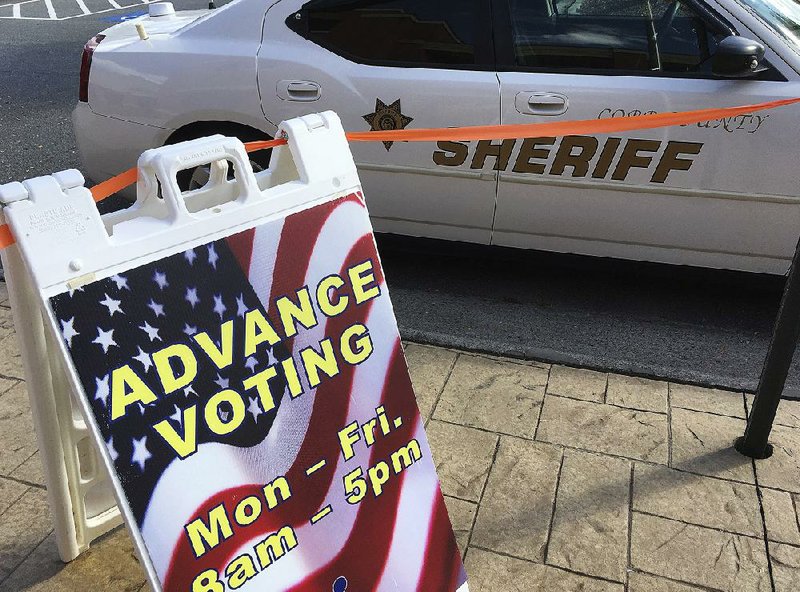Facing Donald Trump's unprecedented warnings of a "rigged" election, state officials around the country are rushing to reassure the public, and some are taking steps to boost security at polling places because of the passions whipped up by the race.
RELATED ARTICLES
http://www.arkansas…">Obama calls vote-rigging talk 'whining' http://www.arkansas…">Ex-agent, official: No Clinton-email bargain
"This election, the environment, is unlike any before," South Carolina Election Commission spokesman Chris Whitmire said.
Some states are trying to coordinate with law enforcement agencies to tighten security without making a heavy-handed show of force. And some schools that double as polling places have canceled classes on Election Day for fear of agitated voters and demonstrators in hallways.
Over the weekend, a firebombing heavily damaged a Republican Party office in North Carolina. No injuries were reported. And after a bomb threat Monday at the Arizona GOP headquarters, the state party said it will probably hire security guards.
[INTERACTIVE: 2016 election coverage]
Trump has called on people to act as "election observers" in certain areas of the country to help prevent fraud -- a move that has stirred fears of voter intimidation and confrontations at the polls.
In North Carolina, state election officials are coordinating with sheriffs to make sure law enforcement agencies know the location of each polling place on Election Day, in case they need to be called.
And in South Carolina, election officials have asked law enforcement agencies to increase patrols near voting locations while being careful not to oversaturate the area and intimidate voters. Under state law, police in South Carolina are not allowed to enter polling places unless they are summoned by election officials.
"If it is not done correctly, not only can it intimidate voters, it can also be against the law," said Adam Gitlin, counsel for the Brennan Center for Justice's Democracy Program at the New York University School of Law. "Many states have laws that specifically provide that election officials are the ones who are in charge of keeping order."
In Falmouth, Maine, officials decided to call off classes at public schools that will be used as polling places on Election Day.
"Mr. Trump has a way to get people excited, I would say. It's on both sides. I think everybody has seen it on TV enough to be concerned," Falmouth Police Chief Ed Tolan said. "We don't need those kinds of demonstrations with students on school grounds."
In Washington, D.C., city election officials will meet with the federal Homeland Security Department to discuss security at polling places and will take extra measures if necessary, Board of Elections spokesman Tamara Robinson said.
Officials in a number of states said they are following standard security procedures for elections and are not taking any special precautions.
"There is a reasonable level of paranoia," said Ken Menzel, general counsel for the Illinois Board of Elections. "But I'm not hearing that the level of paranoia is much different from in previous years."
In metropolitan Atlanta, the Cobb County sheriff's office said the Georgia Constitution requires the county sheriff to provide security at each polling place and that the agency does that for every election.
Officials around the country also sought to reassure the public that the election is secure against rigging.
Kentucky Secretary of State Alison Lundergan Grimes, a Democrat, said Trump's comments were "dangerous and divisive." In Tennessee, Republican Secretary of State Tre Hargett said the election will be "fair and honest."
"Anything that causes people to have less confidence to vote, I frown upon, regardless of what party that comes from," he said.
In heavily Democratic Philadelphia, a city Trump singled out as a place to watch for fraud, elected leaders bristled at such allegations as an attempt to disrupt voting and discourage members of minority groups from going to the polls.
"We will not tolerate any sort of foolishness on Election Day, and it's even insulting to suggest that Philadelphians would," said Democratic City Councilman Cindy Bass.
But in Indiana, the state's chief elections official said Tuesday that thousands of voter registrations had been altered, raising concerns about possible fraud and prompting her office to warn voters to check whether their information is correct online and to vote early to avoid problems on Election Day.
Secretary of State Connie Lawson said in a statement that Indiana's online voter registration database had not been hacked but that records were changed on paper forms, online and at Bureau of Motor Vehicles offices.
"At this time, my office is not sure why these records were changed, but we have evaluated the Statewide Voter Registration System and have found no indication it has been compromised," said Lawson, a Republican.
In addition to the presidential vote, Indiana has fiercely contested statewide races to replace Gov. Mike Pence, who became Trump's running mate, and to succeed retiring U.S. Sen. Dan Coats, a Republican.
The Indiana voter-registration problem surfaced when voters contacted the secretary of state's office after discovering through the online system voters can use to check their registration status that their dates of birth or first names were incorrect, the office said. That prompted the office to run a report in the statewide system, and it found that thousands of registrations had been altered. The office declined to provide a more precise number.
All of those who contacted the office after discovering changes had voted in Indiana's May primary, Lawson's office said.
The information collected on the altered registrations has been turned over to Indiana State Police, which already was conducting a separate investigation of possible voter-registration fraud in 56 counties, said Valerie Warycha, a spokesman for Lawson.
If a registered voter shows up at the polls on Nov. 8, the person will be allowed to vote even if his record shows some incorrect information, Warycha said.
Information for this article was contributed by Patrick Whittle, David Sharp, Astrid Galvan, Ben Nuckols, Megan Trimble and Rick Callahan of The Associated Press.
A Section on 10/19/2016
